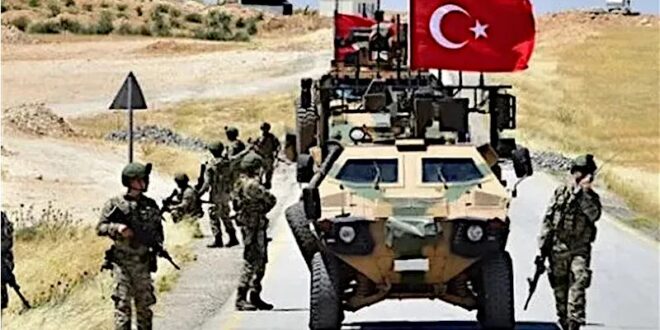With rising tensions between Turkey and Kurdish groups in Iraq and Syria, critical energy infrastructure is increasingly at risk of attack. While both sides experimented with attacking energy infrastructure such as pipelines in the past, the Turkish foreign minister’s recent declaration suggests that this will now become a regular feature of the conflict. Millions of civilians rely on that infrastructure for energy, water, and food, and its destruction could further destabilize the region, allowing the return of actors like ISIS.
Turkish Foreign Minister Hakan Fidan’s declaration on October 4, 2023, marked a shift in Turkey’s strategy. Fidan asserted that all infrastructure, superstructure, and energy facilities associated with the Kurdish Workers’ Party (PKK) and People’s Defense Units (YPG), especially in Iraq and Syria, are now legitimate targets for Turkish security forces, armed forces, and intelligence units. With this strategy, Turkey seeks to target an important source of funding for the Kurdish groups. Since the PKK attack in Ankara on October 1, there has been an increase in both the frequency and geographic scale of Turkish airstrikes. The conflict dates back to 1984, with the Kurdish nationalist PKK designated as a terrorist organization by Turkey, the United States, the European Union, and various other entities. Turkey views the YPG as a PKK-affiliated organization, although the United States has supported the group financially and militarily as part of its fight against ISIS.
As of mid-October, half of the YPG-controlled oil and electricity facilities in Syria have been destroyed, according to the head of the Kurdish-led Syrian Democratic Forces (SDF). 14 oil stations, 9 power stations, and 8 water stations have reportedly been hit. The YPG controls almost three-quarters of Syria’s energy resources, including its largest oil field and the three dams responsible for nearly all of the country’s hydroelectric power. Millions of Syrians rely on these resources, and the damage impacts access to electricity, internet, running water, fresh food, and fuel for vehicles. An estimated 4.3 million people have already been impacted by the shortages, and the Al Hasakah governorate has had its electricity and water supply completely cut off for weeks.
The Turkish government has targeted YPG energy infrastructure before, although the tactic was not yet a regular part of its strategy. In November of last year, in response to an attack on Istanbul blamed on the PKK and YPG, Turkish airstrikes damaged power lines, oil fields, and power plants. The attacks caused power outages and shortages of fuel. Essential services and the activities of aid organizations, schools, and most workplaces were disrupted for weeks. One of the targets, a Swedish power plant in Derik, was no longer able to provide electricity to the Allouk Water Station, leaving half a million people without reliable access to clean water for more than a month, shortly after a deadly outbreak of cholera in September due to water and sanitation issues.
Turkey is not the only one targeting energy infrastructure. The PKK has targeted energy infrastructure, including power lines and pipelines, in southeast Turkey and northern Iraq since 1992. Although these bombings are relatively rare, their consequences are profound. One PKK attack on the Kirkuk-Ceyhan oil pipeline in 2015 cost Kurdistan, governed by the Kurdish Regional Government (KRG), approximately $250 million and interrupted the region’s primary revenue source. The loss in revenue threatened the KRG’s ability to maintain stability in northern Iraq.
A lack of stability in the region could lead to the return of terrorist groups like ISIS, which was only defeated with the help of the Kurds. In Iraq, the KRG, at times with the help of the PKK, helped liberate more than 50,000 square kilometers of territory from ISIS control. Similarly, in Syria, the Syrian Democratic Forces (SDF), a coalition dominated by the YPG, liberated large parts of northern Syria from ISIS between 2013 and 2019 in partnership with the United States.
Attacks on oil have repercussions for the global energy market, too. The KRG Iraq exports oil from both northern Iraq and northeastern Syria globally via Turkey. When the KRG is unable to export oil, the countries that depend on its exports, such as Italy, Croatia, and even Taiwan, suffer. Italy relied on Iraqi oil for 13% of its crude oil needs in 2022 after diversifying its oil sources to reduce dependence on Russian oil. Around half of that oil originated in Kurdistan. Recent disruptions in northern Iraqi oil exports, resulting from a court ruling on a dispute between Baghdad and the KRG, have contributed to a global spike in oil prices, exacerbating the ongoing energy crisis.
Protecting energy infrastructure has become crucial for regional stability in the 21st century. To mitigate some of this risk, Turkey has implemented protective measures, including thermal cameras and routine patrols, which quickly and effectively detect leaks and other damage so that infrastructure can be repaired as soon as possible. In contrast, the PKK and YPG may lack the capacity to implement comparable protective measures, exposing their infrastructure to vulnerabilities.
As Turkey’s conflict with the PKK and YPG escalates, the intertwined nature of regional conflicts and energy infrastructure becomes increasingly apparent. These complexities are not unique to Turkey and the Kurds, and policymakers around the world must develop strategies to better protect the critical infrastructure on which civilians depend during armed conflicts. Potential measures include developing better defensive technologies and strengthening international commitments for the protection of civilians. Understanding and addressing the issue is essential for ensuring regional stability and mitigating global energy security’s far-reaching impacts.
 Eurasia Press & News
Eurasia Press & News




